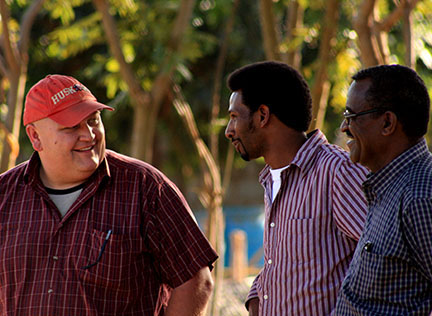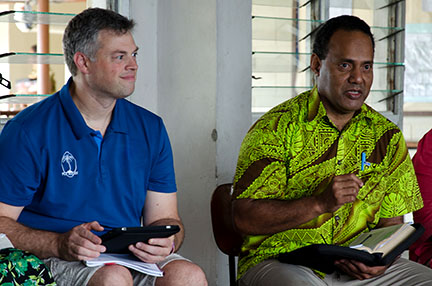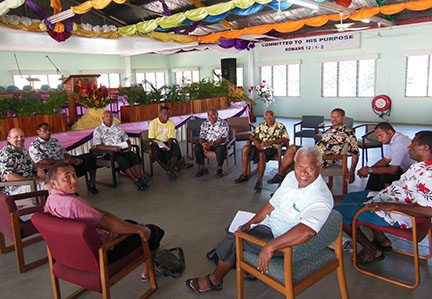Disciples Unleashed

The Jan/Feb 2011 issue of Mission Frontiers featured the remarkable discipleship model of Real Life Ministries (RLM). Over just a dozen years, two couples in a rural town of 30,000 in Northern Idaho, had birthed a discipling church to involve 8,000 members in small discipleship groups which had baptized 700 new believers in the previous year. RLM had also planted six other churches. (See Avery Willis’ “Last Dream”)
Since that report RLM has equipped its members to travel to other countries and share the biblical discipleship principles which God has blessed in their ministry. The results are amazing: 23 new believers baptized in a river in Uganda. Hundreds of pastors united to work toward a common goal in Fiji. A church “resurrected” in Ethiopia—saved from closing its doors to produce growth and new life. Small groups formed or reorganized in Colombia with a new, clearly defined purpose. Pastors rejuvenated in Mexico. And a humble pastor in Burundi traveling to many cities, villages, and even other countries to share the “Jesus model” of discipleship.
Ronald Kizitu ministers in Uganda, Africa. He joined pastors from four African nations at a conference hosted by RLM in neighboring Burundi. Together they experienced what it means to be true to both Jesus’ message and His model. And they became motivated and equipped to make disciples of Jesus who make more disciples.
The tools shared with Ronald and dozens of other pastors in Burundi are not new. RLM’s focus has been studying the way Jesus made disciples and applying those principles in today’s church: 1) Be a true disciple of Jesus, 2) Personally make disciples of Jesus who make more disciples, 3) Create and build real relationships in your disciple-making, 4) Be an intentional leader, 5) Use a process that is reproducible, and 6) Be aligned and unified as a church.
What Ronald learned impacted his personal relationship with God, his family and church, and those who were not yet saved. Resulting fruit included salvations, baptisms, multiplying discipleship-focused small groups, and a rapid increase in the number of people attending the worship services.
Ronald subsequently gathered 326 other Ugandan pastors. Believers and unbelievers alike had previously known these pastors as a divisive group, with much in-fighting and contention. But as they met and turned their focus to Jesus and His simple but powerful model for making disciples, the Holy Spirit touched their hearts. A time of repentance was followed by an outpouring of love and a new unity. Now these pastors are working together to grow God’s kingdom in Uganda.
In Honduras, Kenya, Guatemala, Israel, Congo, Pakistan, and many other nations, the Body of Christ is stirring in a mighty way, hungry for God’s work. Pastors and church leaders all over the world are hearing the call to return to “the Jesus model” of making disciples. Applying the tools Jesus modeled for us is resulting in the church becoming an army of disciples unleashed to impact the world. Let me elaborate on the six principles listed above:
 1. Be a true disciple of Jesus.
1. Be a true disciple of Jesus.
As RLM shares principles of relational discipleship with pastors and leaders from many churches, some put it into practice and bear much fruit. Others make an attempt but see no significant change. One key difference is whether pastors and leaders live and model being a true disciple of Jesus, or merely teach about it. This is easy to ignore, but there is no greater factor in becoming a disciple-making church. Are the pastor and core leaders of the church willing to live out and personally model how to follow Jesus, how to be transformed by Jesus, and how to be “on mission” with Jesus? Being a true disciple of Jesus should be evident not only as we minister but also in how we relate to our spouses, our children, our church family, the lost, our neighbors, our co-workers and our communities. A one dimensional, at-church-only type discipleship accompanied by hollow words is not really following Jesus at all. To lead the church in change we must be willing to be changed ourselves (Matthew 4:19, Luke 5:1-11, Romans 6:8-19, Galatians 2:20).
Bill, a pastor in the Pacific Islands, tells how the biblical principles of relational discipleship impacted him on a very personal level. One of our small group facilitators asked Bill how he could apply “following Jesus, being transformed by Jesus and being on mission with Jesus” (Matthew 4:19) in his own life. Bill gave a general answer, but the facilitator wouldn’t let him off the hook! “Bill, what would that look like, could you give us an actual example in your own life?” This leader of a large church, and director of 141 pastors for his denomination, finally responded with tears in his eyes, “I could cook dinner for my wife and family and serve them. I’ve never done that before.”
Personally journeying with our Savior, getting to know him (Philippians 3:8), allowing, even asking him to change us, is the critical first step if we hope to lead others down the same path.
2. Personally make disciples of Jesus who make more disciples.
If we want a disciple-making church, the pastor and church leadership must themselves be making disciples, not just “training others how to do it.” This is an essential question — “Will the leadership model and live out what it wants the body to do?” (2 Timothy 2:2, 2 Corinthians 3:1-3)
In one of the largest cities in Mexico, pastor Hiram had for several years led a successful, growing church. However he observed that people came and went and, although the congregation was growing numerically, there was little spiritual maturity. Meanwhile he and a handful of leaders were doing all the work of the ministry and were close to burnout. When another national pastor and RLM team shared the biblical model of making disciples, the Holy Spirit confirmed its truth to Hiram. He began making personal changes and passionately seeking to follow Jesus. Then he prayerfully started to invest in a few key leaders. By making disciples who make disciples, Hiram began to see true growth in his church body. Soon, more and more members of the church were actually following Jesus personally and being equipped for the work of the ministry. The leadership load became lighter, and the joy of salvations and transformed lives changed the entire culture of the church. Paco, one of the men Hiram was discipling, soon felt a call to plant a new church. With prayer, approval of leadership, more investment of time and resources and the transforming power of the Holy Spirit, Paco was raised up and released. He now leads a new, healthy, disciple-making church in a nearby area. Hiram is still Paco’s mentor, coach and older spiritual brother. Now Paco is prayerfully raising up the next generation of leaders and church planters from his congregation.
 3. Create and build real relationships in your disciple-making.
3. Create and build real relationships in your disciple-making.
We often see good, biblical teaching given to new converts, yet the new believers show little growth or spiritual maturity. Often our back door is as busy as our front door. People pass through our churches yet they never become the church. (Ephesians 4:11-16)
In Ethiopia, Muller was hired as an administrative assistant to a pastor. He was very gifted and dedicated, but it soon became clear that, more than anything, he had a passion for making disciples of Jesus. Muller does something that is key to making disciples; he loves people and invests in them. He cares about them, shepherds them, teaches them, stretches them, corrects them and coaches them. Talking with the people Muller is discipling reveals that he is in a deep and transparent relationship with each of them. Real relationship gives strength to the process. Muller, like Jesus, is modeling for his disciples a willingness to invest in their lives.
4. Be an intentional leader.
“Can I be a disciple of Jesus by accident?” “Can I make a disciple of Jesus accidentally?” By definition of the word, and from the model that Jesus left for us, the answer to both questions is “No.” It is essential that our churches be fully intentional in being disciples of Jesus, making disciples of Jesus and leading disciple-making churches. (Matthew 28:18-20)
In Burundi, Africa, Peter is the humble, quiet pastor of a local church. God orchestrated a series of events which led to Peter attending a discipleship training hosted by RLM in Ethiopia. Due to financial pressures Peter was basically “stuck” with the training team for over two weeks.
Peter’s English is passable, but it takes a great deal of effort for him to understand English. After two weeks of training, struggling with language, traveling with “strangers,” and being away from home and family, I found Peter crying in the dark near our bunkhouse. Feeling it must all be too much for him, I gave Peter a hug and asked if he was OK. Peter told me, “These have been the best two weeks of my life. I am so much closer to Jesus and I see how he wants me to lead my church when I return to Burundi.” Peter then returned to Burundi and began becoming the leader Jesus was asking him to be, living as a true disciple and prayerfully selecting a few men in which to invest. He started casting vision for his church from the pulpit each Sunday, then living it out himself during the week. Peter led a small group, chose an “apprentice,” and led people to the Lord. As his group grew, he continued discipling others intentionally. When his apprentice was ready, Peter took his group step by step through a branching process. Then he continued to coach his old apprentice as the leader of the newly branched group. Peter has been a great example of an intentional leader. He has not hurried the process, but continues one step at a time to thoughtfully and prayerfully lead and disciple. Now his church is experiencing steady growth. Groups are branching, people are being led to the Lord and then discipled, and new leaders are being raised up and released to make more disciples. Peter has truly responded to what God showed him about “being the leader He wants me to be.”
 5. Use a process that is reproducible.
5. Use a process that is reproducible.
Jesus, the master discipler, left us with an effective and reproducible model. If I disciple fifty men but the way I do so is not reproducible, the impact ends there. Jesus’ perfect way to reach the world was given in a form that is highly reproducible.
After attending a training hosted by RLM in a neighboring country, Ronald (mentioned earlier), returned to the church he pastors in Uganda with a determination to equip the members to make disciples. Ronald began to invest in several men. He was excited to see them respond. But he was a bit discouraged when, several months later, he tried to get these men discipling others. Through prayer and coaching, Ronald realized he was missing a key ingredient — having a reproducible process. Ronald had used gifts, experience, abilities and training that the typical member of his church did not have. Knowing that Jesus had taken 12 “regular guys” to be his disciples, not 12 highly trained and experienced religious leaders, Ronald studied both the message and the method Jesus used with his disciples. He began to search out the simple yet powerful principles for making disciples—things that could be taught, modeled and caught by “regular” members. This became exciting to Pastor Ronald and to those he was discipling. Not only were they able to understand and follow the model, but they could easily pass it on to those they were discipling. The discipleship “chain” Paul describes in 2 Timothy 2:2 became a reality! Now, instead of one excited pastor trying to do all the work, Ronald is leading an army of disciplers who know how to reproduce. The impact is clearly visible—in his own church, in other churches he has helped, and throughout the nation of Uganda.
 6. Be aligned and unified as a church.
6. Be aligned and unified as a church.
As Jesus taught many times and in many ways, unity and alignment are essential in God’s ministry. Skills, gifts, talents, organization, materials, resources, and strong leaders are all wonderful assets to making disciples of Jesus. But without alignment and unity in a church, among both leadership and members, results will be minimal (Mark 3:24-26, John 17:21).
Jasa, pastor of a church of 200, attended a two-day discipleship training RLM hosted in Suva, Fiji. Not only did the biblical principles of discipleship impact Jasa deeply on a personal level, but he was led to bring these truths to his church in a very intentional manner. Jasa started with his own life, making changes as led by the Holy Spirit. He shared his journey with his wife and family, modeling what it means to be a true follower of Jesus. Next he and his wife began to disciple another couple who were in a leadership role in their church. He shared with the church board what he was learning and experiencing. They could see the transformation and the fruit of Jasa’s pursuit of Jesus. After several months the board decided this was the path for the whole church to follow. Intentionally, they began to speak, teach, model and champion biblical discipleship. This moved the church membership to respond and emulate — being disciples of Jesus and making
more disciples.
The road was not without obstacles, but an intentional leader and a unified church leadership was a huge factor in successfully turning the ship.
With God’s help, these six principles can help a stagnant church or Christian leader to experience multiplication. Jesus is the God-given model for making disciples with the power to fulfill their responsibilities. This power is enough to storm the gates of hell. The potential for opening our church doors and releasing his followers is earth shaking! People all over the world are experiencing a stirring within, a calling to become disciples unleashed. Do we want anything more than to be his true disciples?









comments